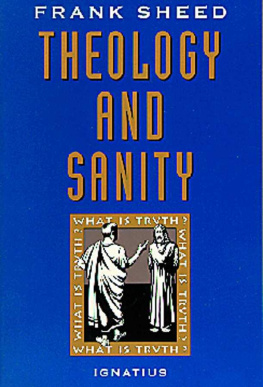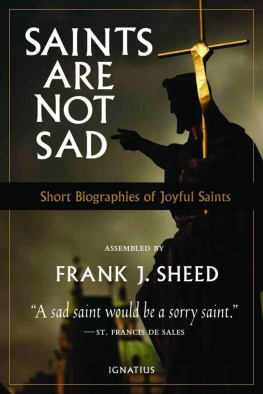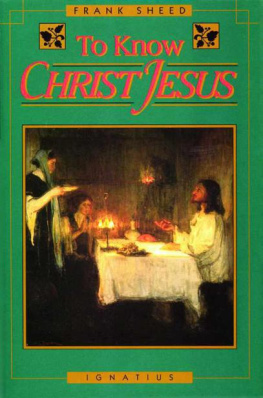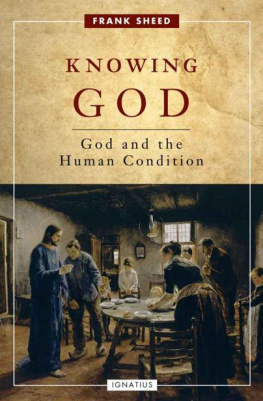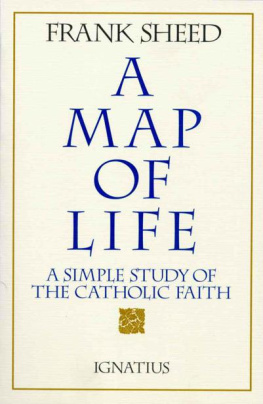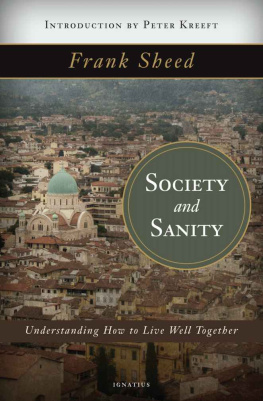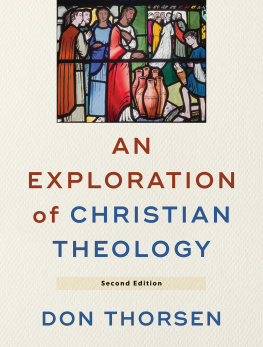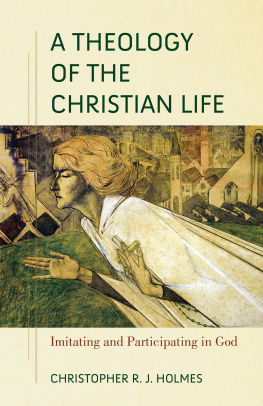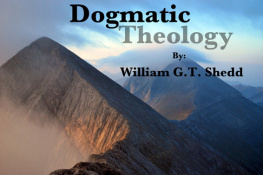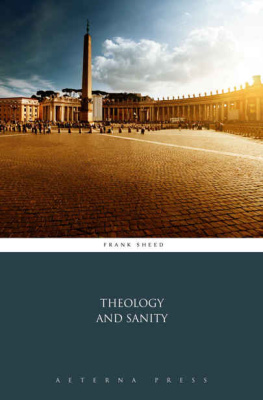Frank Sheed - Theology and Sanity
Here you can read online Frank Sheed - Theology and Sanity full text of the book (entire story) in english for free. Download pdf and epub, get meaning, cover and reviews about this ebook. year: 1993, publisher: Ignatius Press, genre: Religion. Description of the work, (preface) as well as reviews are available. Best literature library LitArk.com created for fans of good reading and offers a wide selection of genres:
Romance novel
Science fiction
Adventure
Detective
Science
History
Home and family
Prose
Art
Politics
Computer
Non-fiction
Religion
Business
Children
Humor
Choose a favorite category and find really read worthwhile books. Enjoy immersion in the world of imagination, feel the emotions of the characters or learn something new for yourself, make an fascinating discovery.
- Book:Theology and Sanity
- Author:
- Publisher:Ignatius Press
- Genre:
- Year:1993
- Rating:4 / 5
- Favourites:Add to favourites
- Your mark:
- 80
- 1
- 2
- 3
- 4
- 5
Theology and Sanity: summary, description and annotation
We offer to read an annotation, description, summary or preface (depends on what the author of the book "Theology and Sanity" wrote himself). If you haven't found the necessary information about the book — write in the comments, we will try to find it.
Theology and Sanity — read online for free the complete book (whole text) full work
Below is the text of the book, divided by pages. System saving the place of the last page read, allows you to conveniently read the book "Theology and Sanity" online for free, without having to search again every time where you left off. Put a bookmark, and you can go to the page where you finished reading at any time.
Font size:
Interval:
Bookmark:
THEOLOGY AND SANITY
FRANK J. SHEED
IGNATIUS PRESS SAN FRANCISCO
Original edition 1946, 1978 F. J. Sheed
Published with ecclesiastical approval
All rights reserved
Cover design by Roxanne Mei Lum
Published in 1993 by Ignatius Press
ISBN 978-0-89870-470-9
Library of Congress Catalogue number 93-78529
Printed in the United States of America
CONTENTS
FOREWORD TO THE FIRST EDITION
I played with the thought of dedicating this book To All Who Know Less Theology Than I. It would have sounded flippant. But it would have been exact. There are thousands who know more theology than I, and for them I have no message: they must teach me. But there are thousands who know less, and less is not enough: I must try to teach them. This book contains theology, not the great mass of it that theologians need, but the indispensable minimum that every man needs in order that he may be living mentally in the real worldwhich is what the word sanity means in my title.
Sanity, remember, does not mean living in the same world as everyone else; it means living in the real world. But some of the most important elements in the real world can be known only by the revelation of God, which it is theologys business to study. Lacking this knowledge, the mind must live a half-blind life, trying to cope with a reality most of which it does not know is there. This is a wretched state for an immortal spirit, and pretty certain to lead to disaster. There is a good deal of disaster around at this moment.
F.J.S.
PREFACE TO THE REVISED EDITION
Thirty-Three Years After
When I wrote Theology and Sanity , I had been teaching the Faith under the open sky for a quarter of a century. The priests who had trained me and others for the work were Aquinas men; but it was from translating St. Augustines Confessions that I went on to the writing of the book. So Augustine and Aquinas both went into it, in what proportion I could not tell. Now, a third of a century later, I am bringing out this revision. And I still cannot tell.
But Augustine and Aquinasand Matthew and Mark and Luke and John and Paulwere not the only influences in its shaping. Every paragraph had been tried out on forty or fifty outdoor audiences before I got it down on paper. Listeners were free to walk away the moment they were boredI tried to learn from their boredom. If they stayed, they could utter their reactionsanything from agreement to intelligent criticism to mockery to blasphemywith a freedom which speakers who knew only the ivory tower of pulpit or lecture hall found unnerving. It was unbelievably educative. I doubt if there was any objection against the Faith in all the centuries that was not hurled at us. And, unlike the great theologians whose writings had helped to form our minds, we could not go off and think about the objection for a year or two, then write an article. We had to copesomehowthere and then.
The crowd was truly co-author of the book; not a sentence that has not been reshaped by them. This really is aggiornamento doctrines restated, not to be made more acceptable but more comprehensible, related to the questions people were actually asking, to the needs they were actually feeling, in the language they actually spoke. One early reviewer of Theology and Sanity liked the book well enough but observed that it did not contain the phrase hypostatic union. I was reminded of an earlier incident. I had asked a learned theologian why the great third-century thinker Origen had not been canonized: Good heavens, was the crushing answer, he believed in the Apokatastasis. Theological language is a useful tool for specialists: I learnt to use it: then I learnt not to. I got more out of the specialists by forcing them into plain English.
The non-Catholic world has not made so full a contribution to the present revision, since in the last ten years I have done no outdoor speaking (it is not for septuagenarians). But Catholics, in groups and singly, have met me with as many difficulties and doubts and refusals as the old street-corner crowds.
Think of all that has happened within the Church since 1945. Pius XII had a dozen years still to reign, and the predisposition to accept what came from Rome was still fairly general. Pius never knew, and we never imagined, the angry refusal of such masses of Catholics which followed Pope Pauls encyclical on contraception. As it happened, that was only the culmination of a loss of confidence in the teaching Church, which had begun long before and came fully into the light when John XXIII opened the famous window.
But in 1945, none of this was apparent. Priests were not yet smiling their amusement over our accepting doctrines and practices which they themselves had been teaching us all our lives. We had not grown accustomed to hearing the Angel of the Annunciation bracketed with Santa Claus, or all the reality syphoned out of Resurrection and Ascension, leaving for our nourishment only the spiritual meaning of incidents all the truer for never having happened!
But in the same period, great things were happening. I list a handful, unique every one of them, which have made a difference to this revision.
In 1950, Pius XII issued the encyclical Humani generis . It had in it the words, to me totally stunning: Without biblical theology, dogmatic theology becomes sterile. I have done no great reading in papal documents, but I wonder if that particular statement had ever been made before. If it had, why had I, in forty years of teaching the Faith, never come across it?
I had found more and more spiritual value in reading Scripture; I had happily used Scripture quotations in support of Catholic doctrine. Meditating on the word sterile, I recognized at last that Doctrine and Scripture were two approaches from different angles to the same reality, under the guidance of the same Holy Spirit, each necessary to the fullness of the other. One result was that I made a new study of the actual words of Genesis, wrote Genesis Regained , and found the doctrines of Original Sin, Baptism, and Redemption desterilized for me.
At the very end of his life, Pius XII reminded a gathering of canonists and moral theologians that while they had always known that physical impotence was fatal to the union which was of the essence of marriage, there was a psychic impotence just as fatal, and he wanted them to give their minds to it. This statement has already worked a salutary revolution in the treatment of the anguish of failed marriages.
In his first Christmas Allocution, Pope John used a phrase as revolutionary in a different area. He referred to the other Christian churches as bearing the name of Christ on their foreheadsthus rolling back four centuries of mutual hatred and making possible at least a union of hearts among all who loved Christ our Lord.
With the whole Catholic sky exploding above them, the bishops of Vatican II kept their heads most marvelously. Somewhere else, I describe myself standing in front of St. Peters as one session was concluding, watching the whole twenty-five hundred of them streaming out, and singing to myself the Gilbert and Sullivan lines
Bishops in their shovel hats
Were plentiful as tabby cats ,
In point of fact too many .
But when I heard the same men singing the Nicene Creed together, I knew that something vast was in process. And the documents of the Council prove it.
I quote two:
(1) On the doctrinal differences between ourselves, and the Eastern Orthodox Church: It is hardly surprising if one tradition has come nearer than the other to the exact appreciation of certain aspects of a revealed mystery.... These varying theological formulations are often to be considered as complementary rather than competing. Surely this is a mildness unparalleled. And while the Protestant churches are not seen as in the same relation to us as the Orthodox, it would be hard to find any earlier statement even remotely like Whatever is wrought by the grace of the Holy Spirit in the hearts of our separated brethren can contribute to our own spiritual up-building. That went one step beyond the point I myself had reached, after Theology and Sanity but before the Council, namely, that those other churches were doing an essential work for Christsince, for all sorts of reasons, there are countless millions of Christians who will not accept anything, even Christ, from the Catholic Church, it is a great thing that He is being brought to them by churches they are willing to listen to.
Next pageFont size:
Interval:
Bookmark:
Similar books «Theology and Sanity»
Look at similar books to Theology and Sanity. We have selected literature similar in name and meaning in the hope of providing readers with more options to find new, interesting, not yet read works.
Discussion, reviews of the book Theology and Sanity and just readers' own opinions. Leave your comments, write what you think about the work, its meaning or the main characters. Specify what exactly you liked and what you didn't like, and why you think so.

